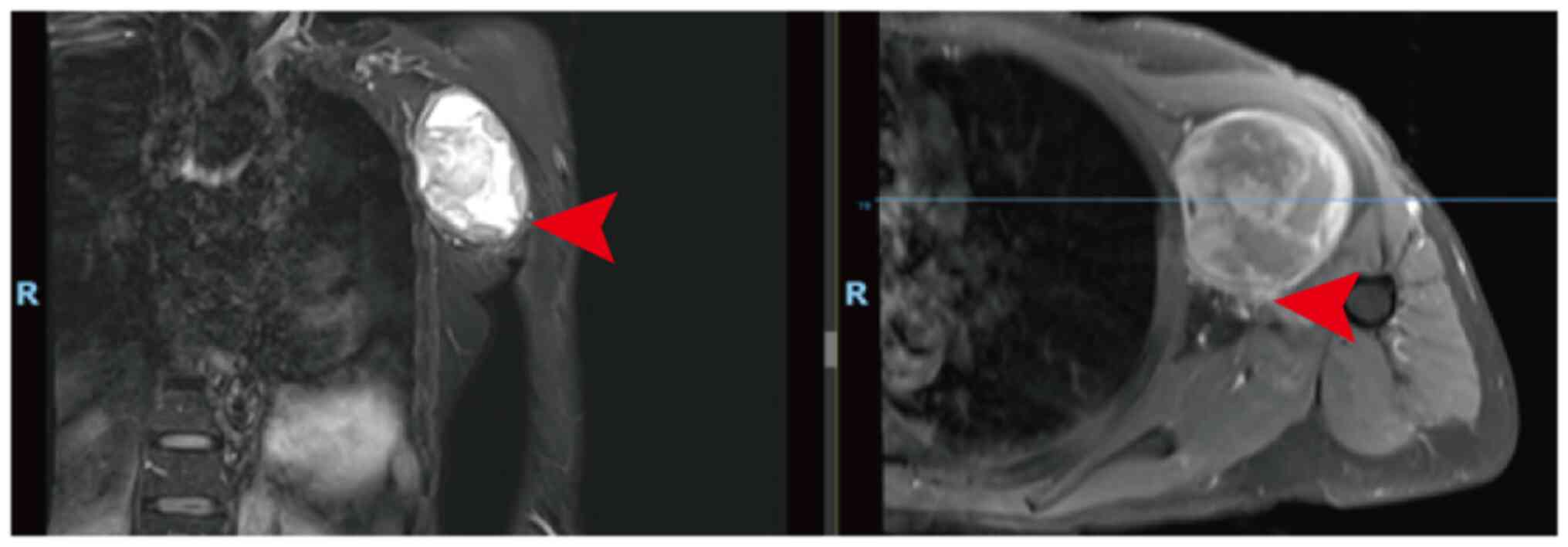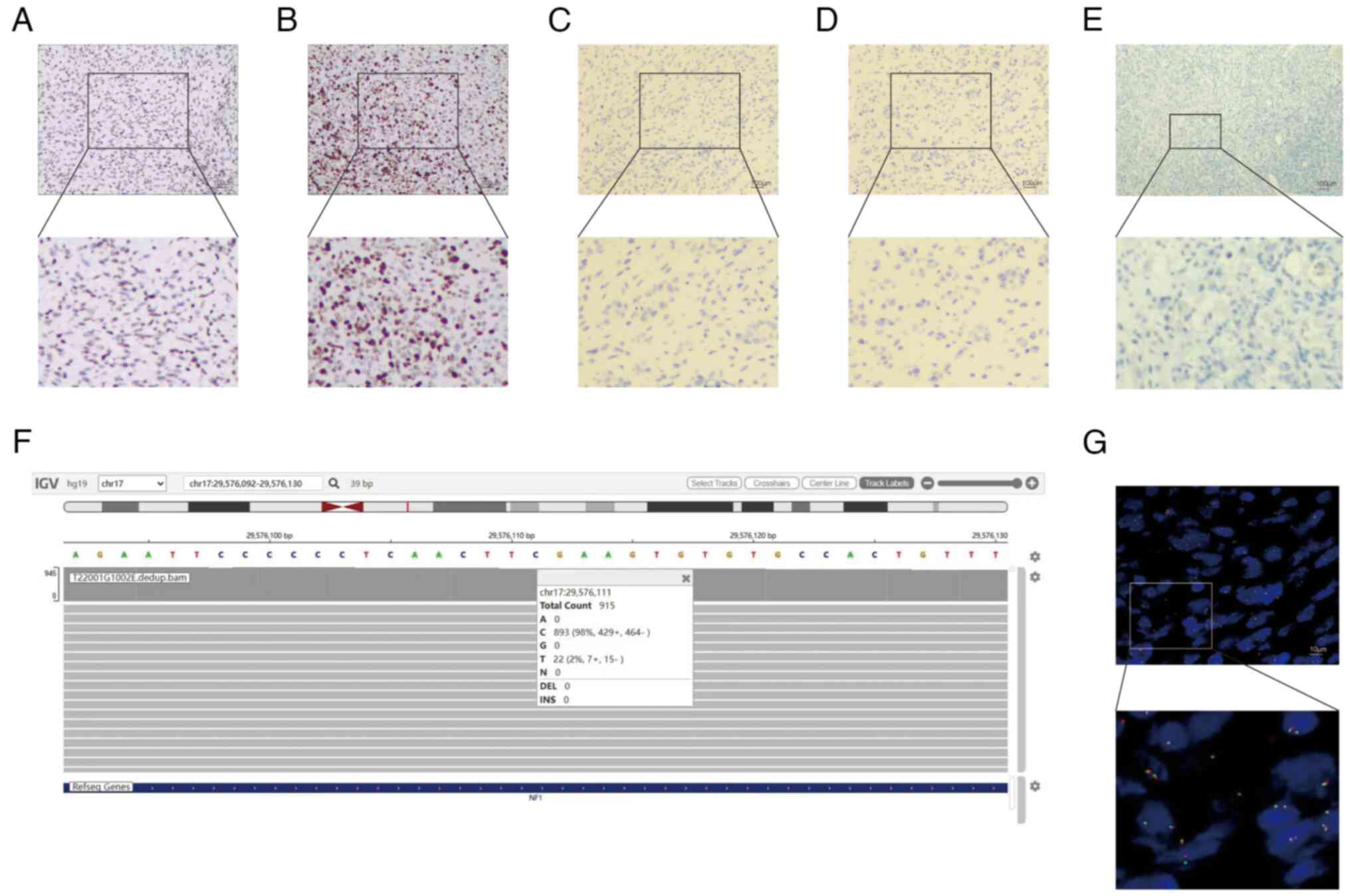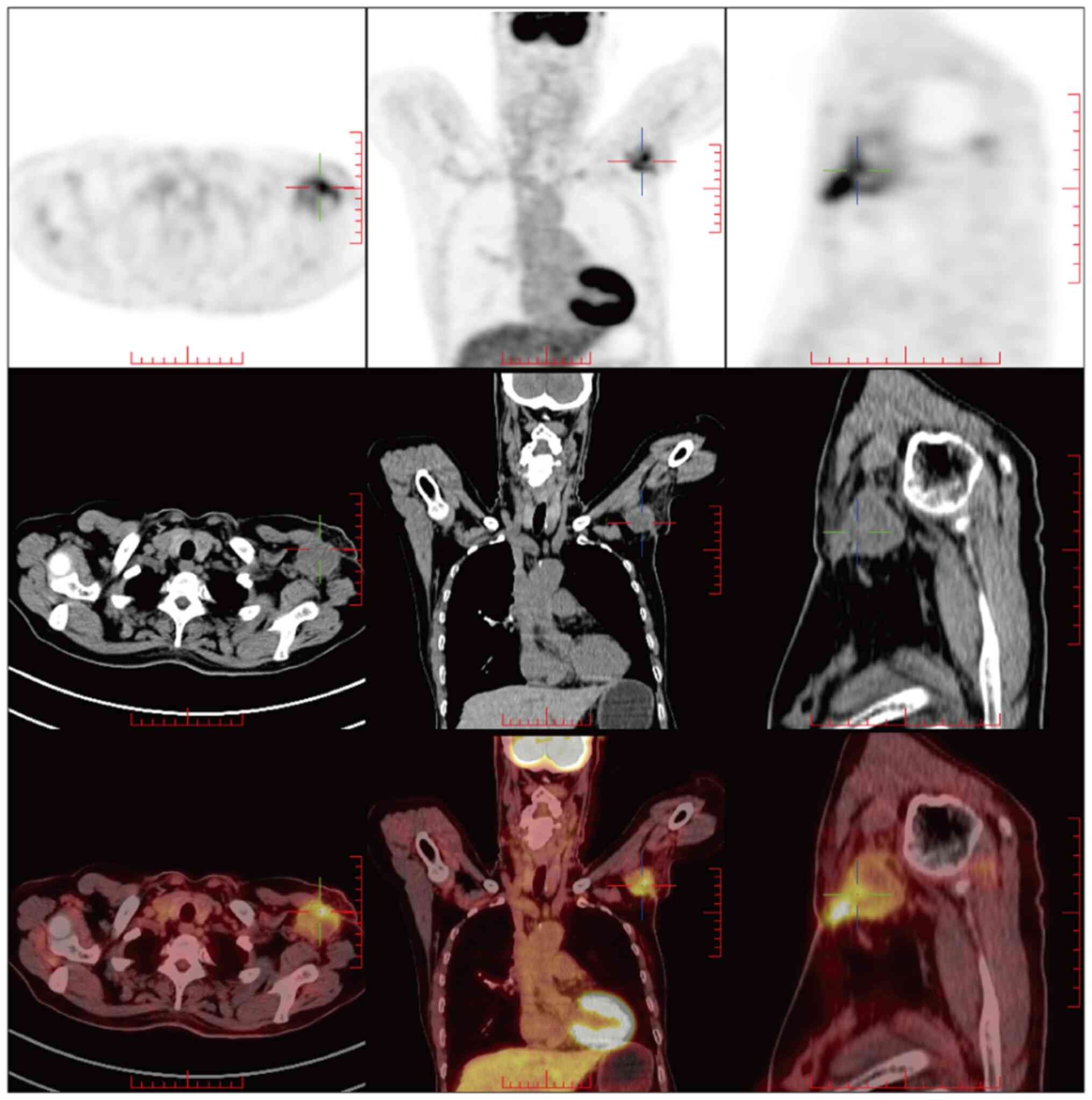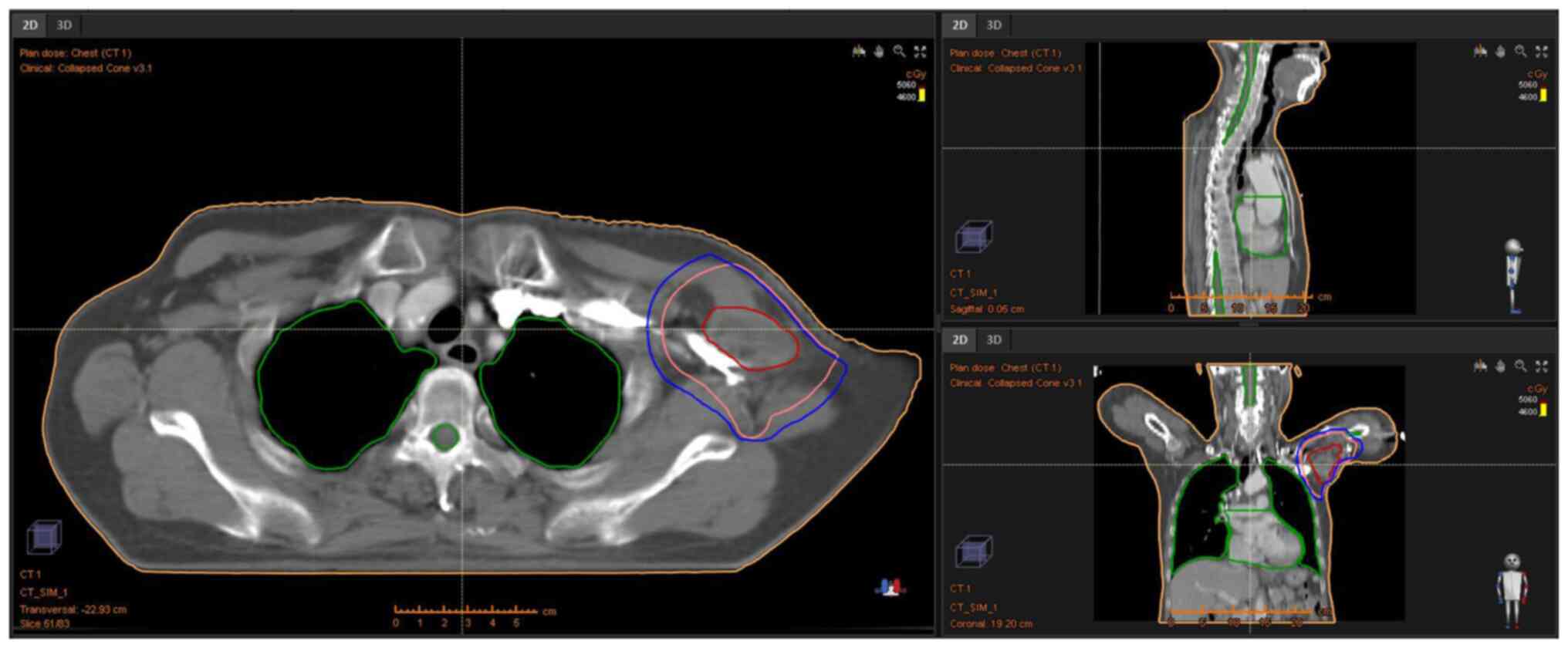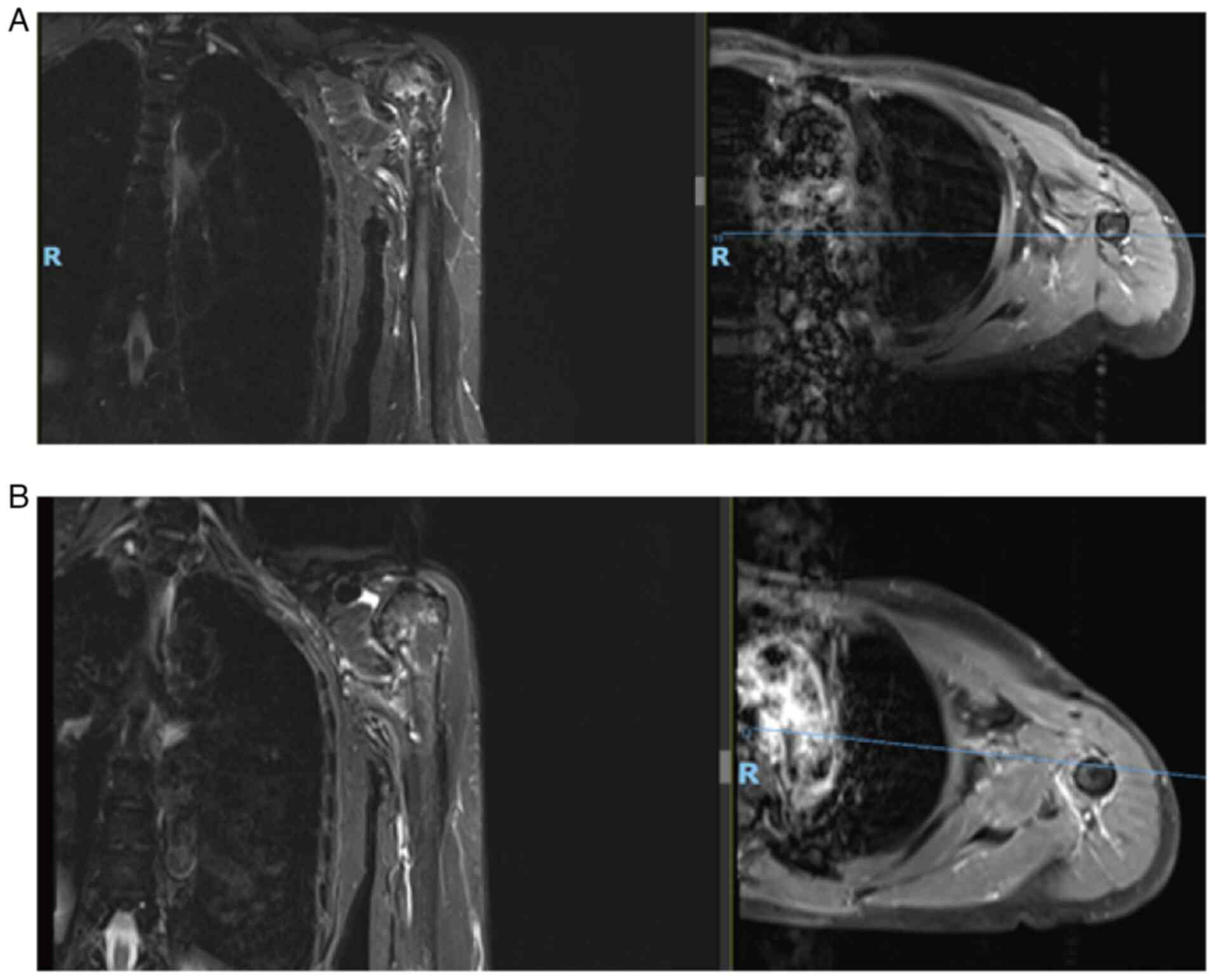|
1
|
Knight SWE, Knight TE, Santiago T, Murphy
AJ and Abdelhafeez AH: Malignant peripheral nerve sheath Tumors-A
comprehensive review of pathophysiology, diagnosis, and
multidisciplinary management. Children (Basel 9). 382022.
|
|
2
|
Cai Z, Tang X, Liang H, Yang R, Yan T and
Guo W: Prognosis and risk factors for malignant peripheral nerve
sheath tumor: A systematic review and meta-analysis. World J Surg
Oncol. 18:2572020. View Article : Google Scholar : PubMed/NCBI
|
|
3
|
Ferner RE and Gutmann DH: International
consensus statement on malignant peripheral nerve sheath tumors in
neurofibromatosis. Cancer Res. 62:1573–1577. 2002.PubMed/NCBI
|
|
4
|
Riad S, Biau D, Holt GE, Werier J,
Turcotte RE, Ferguson PC, Griffin AM, Dickie CI, Chung PW, Catton
CN, et al: The clinical and functional outcome for patients with
radiation-induced soft tissue sarcoma. Cancer. 118:2682–2692. 2012.
View Article : Google Scholar : PubMed/NCBI
|
|
5
|
Widemann BC: Current status of sporadic
and neurofibromatosis type 1-associated malignant peripheral nerve
sheath tumors. Curr Oncol Rep. 11:322–328. 2009. View Article : Google Scholar : PubMed/NCBI
|
|
6
|
Okada K, Hasegawa T, Tajino T, Hotta T,
Yanagisawa M, Osanai T, Nishida J, Seki K and Itoi E: Clinical
relevance of pathological grades of malignant peripheral nerve
sheath tumor: A multi-institution TMTS study of 56 cases in
Northern Japan. Ann Surg Oncol. 14:597–604. 2007. View Article : Google Scholar : PubMed/NCBI
|
|
7
|
Louis DN, Ohgaki H, Wiestler OD, Cavenee
WK, Burger PC, Jouvet A, Scheithauer BW and Kleihues P: The 2007
WHO classification of tumours of the central nervous system. Acta
Neuropathol. 114:972007. View Article : Google Scholar : PubMed/NCBI
|
|
8
|
Rodriguez FJ, Folpe AL, Giannini C and
Perry A: Pathology of peripheral nerve sheath tumors: Diagnostic
overview and update on selected diagnostic problems. Acta
Neuropathol. 123:295–319. 2012. View Article : Google Scholar : PubMed/NCBI
|
|
9
|
Le Guellec S, Decouvelaere AV, Filleron T,
Valo I, Charon-Barra C, Robin YM, Terrier P, Chevreau C and Coindre
JM: Malignant peripheral nerve sheath tumor is a challenging
diagnosis: A systematic pathology review, immunohistochemistry, and
molecular analysis in 160 patients from the French sarcoma group
database. Am J Surg Pathol. 40:896–908. 2016. View Article : Google Scholar : PubMed/NCBI
|
|
10
|
Goertz O, Langer S, Uthoff D, Ring A,
Stricker I, Tannapfel A and Steinau HU: Diagnosis, treatment and
survival of 65 patients with malignant peripheral nerve sheath
tumors. Anticancer Res. 34:777–783. 2014.PubMed/NCBI
|
|
11
|
Bradford D and Kim A: Current treatment
options for malignant peripheral nerve sheath tumors. Curr Treat
Options Oncol. 16:3282015. View Article : Google Scholar : PubMed/NCBI
|
|
12
|
Li G, Liu C, Liu Y, Xu F, Su Z, Wang Y,
Ren S, Deng T, Huang D, Tian Y and Qiu Y: Analysis of clinical
features and prognosis of malignant triton tumor: A report of two
cases and literature review. Oncol Lett. 10:3551–3556. 2015.
View Article : Google Scholar : PubMed/NCBI
|
|
13
|
Kamran SC, Howard SA, Shinagare AB,
Krajewski KM, Jagannathan JP, Hornick JL and Ramaiya NH: Malignant
peripheral nerve sheath tumors: Prognostic impact of
rhabdomyoblastic differentiation (malignant triton tumors),
neurofibromatosis 1 status and location. Eur J Surg Oncol.
39:46–52. 2013. View Article : Google Scholar : PubMed/NCBI
|
|
14
|
Tsimpinos M, Pigadiotis E, Kontaxis V and
Lioulias A: Giant malignant triton tumour of the posterior
mediastinum. Interact Cardiovasc Thorac Surg. 33:657–659. 2021.
View Article : Google Scholar : PubMed/NCBI
|
|
15
|
McConnell YJ and Giacomantonio CA:
Malignant triton tumors-complete surgical resection and adjuvant
radiotherapy associated with improved survival. J Surg Oncol.
106:51–56. 2012. View Article : Google Scholar : PubMed/NCBI
|
|
16
|
Bins RB, Pinzon CE, da Silva Pereira LD,
Bertuol M, Isolan P and Takamatu EE: Malignant triton tumor of the
kidney in a child: A case report. Int J Surg Case Rep.
85:1062522021. View Article : Google Scholar : PubMed/NCBI
|
|
17
|
Zhao A, Ding D, Li X and Wang J: Malignant
triton tumor in a child: Case report and literature review. Cancer
Manag Res. 11:10759–10766. 2019. View Article : Google Scholar : PubMed/NCBI
|
|
18
|
Stasik CJ and Tawfik O: Malignant
peripheral nerve sheath tumor with rhabdomyosarcomatous
differentiation (malignant triton tumor). Arch Pathol Lab Med.
130:1878–1881. 2006. View Article : Google Scholar : PubMed/NCBI
|
|
19
|
Lai Z, Markovets A, Ahdesmaki M, Chapman
B, Hofmann O, McEwen R, Johnson J, Dougherty B, Barrett JC and Dry
JR: VarDict: A novel and versatile variant caller for
next-generation sequencing in cancer research. Nucleic Acids Res.
44:e1082016. View Article : Google Scholar : PubMed/NCBI
|
|
20
|
Amin MB, Greene FL, Edge SB, Compton CC,
Gershenwald JE, Brookland RK, Meyer L, Gress DM, Byrd DR and
Winchester DP: The eighth edition AJCC cancer staging manual:
Continuing to build a bridge from a population-based to a more
‘personalized’ approach to cancer staging. CA Cancer J Clin.
67:93–99. 2017. View Article : Google Scholar : PubMed/NCBI
|
|
21
|
Masson P: Recklinghausen's
neurofibromatosis, sensory neuromas and motor neuromas. libman
anniversary New York. 1932.
|
|
22
|
Woodruff JM, Chernik NL, Smith MC, Millett
WB and Foote FW Jr: Peripheral nerve tumors with
rhabdomyosarcomatous differentiation (malignant ‘Triton’ tumors).
Cancer. 32:426–439. 1973. View Article : Google Scholar : PubMed/NCBI
|
|
23
|
de Traux de Wardin H, Dermawan JK, Vanoli
F, Jiang SC, Singer S, Chi P, Tap W, Wexler LH and Antonescu CR:
NF1-Driven rhabdomyosarcoma phenotypes: A comparative clinical and
molecular study of NF1-Mutant rhabdomyosarcoma and NF1-associated
malignant triton tumor. JCO Precis Oncol. 8:e23005972024.
View Article : Google Scholar : PubMed/NCBI
|
|
24
|
Marcel AD, Aleksandar M, Rainer H,
Grüneisen JS, Haubold J, Opitz MK, Bauer S, Umutlu L, Forsting M
and Schaarschmidt BM: Impact of CT and MRI in the diagnostic workup
of malignant triton tumour-a monocentric analysis and review of the
literature. Br J Radiol. 97:430–438. 2024. View Article : Google Scholar
|
|
25
|
Karamchandani JR, Nielsen TO, van de Rijn
M and West RB: Sox10 and S100 in the diagnosis of soft-tissue
neoplasms. Appl Immunohistochem Mol Morphol. 20:445–450. 2012.
View Article : Google Scholar : PubMed/NCBI
|
|
26
|
Otsuka H, Kohashi K, Yoshimoto M, Ishihara
S, Toda Y, Yamada Y, Yamamoto H, Nakashima Y and Oda Y:
Immunohistochemical evaluation of H3K27 trimethylation in malignant
peripheral nerve sheath tumors. Pathol Res Pract. 214:417–425.
2018. View Article : Google Scholar : PubMed/NCBI
|
|
27
|
Jurisic V, Radenkovic S and Konjevic G:
The actual role of LDH as tumor marker, biochemical and clinical
aspects. Adv Exp Med Biol. 867:115–124. 2015. View Article : Google Scholar : PubMed/NCBI
|
|
28
|
Judith VMGB: Jason L. Hornick: Practical
soft tissue pathology: A diagnostic approach, 2nd edition. Virchows
Arch. 473:785–786. 2018. View Article : Google Scholar : PubMed/NCBI
|
|
29
|
Mokhtari M, Safavi D, Soleimani N,
Monabati A and Safaei A: Carcinoma of unknown primary origin:
Application of immunohistochemistry with emphasis to different
cytokeratin 7 and 20 staining patterns. Appl Immunohistochem Mol
Morphol. 30:623–634. 2022. View Article : Google Scholar : PubMed/NCBI
|
|
30
|
Tuffaha MMSA, Guski H and Kristiansen G:
Immunohistochemistry in Tumor Diagnostics. 2017.
|
|
31
|
Yurina M and Khin T: Malignant peripheral
nerve sheath tumor with divergent glandular differentiation. Int J
Surg Pathol. 25:310–313. 2017. View Article : Google Scholar : PubMed/NCBI
|
|
32
|
Who WHO, . WHO Classification of Tumours
of Soft Tissue and Bone: WHO Classification of Tumours. vol. 5:WHO
classification of tumours of soft tissue and bone. 2013.
|
|
33
|
AlAli B and Amr S: Malignant glandular
triton tumor arising in the radial nerve with prolonged survival: A
case report and review of the literature. Case Rep Pathol.
2021:46141852021.PubMed/NCBI
|
|
34
|
Yasuda M, Muto Y, Kuremoto T, Murakami K,
Onisihi T, Koida A, Inui T and Hisa Y: A case of recurrent
malignant triton tumor successfully treated with radiotherapy.
Auris Nasus Larynx. 43:710–714. 2016. View Article : Google Scholar : PubMed/NCBI
|
|
35
|
Ailing Z, Daling D, Xueqin L and Jiangtao
W: Malignant triton tumor in a child: Case report and literature
review. Cancer Manag Res. 11:10759–10766. 2020.PubMed/NCBI
|
|
36
|
Angel G, Jose Luis P, David R and
Francisco B: Malignant triton tumor of the kidney. New location not
previously reported. Urol Int. 99:121–123. 2015.
|
|
37
|
Ba MC, Long H, Cui SZ, Gong YF, Yan ZF,
Wang S and Wu YB: Mild hyperthermia enhances sensitivity of gastric
cancer cells to chemotherapy through reactive oxygen
species-induced autophagic death. Tumour Biol.
39:10104283177119522017. View Article : Google Scholar : PubMed/NCBI
|
|
38
|
Ohguri T, Harima Y, Imada H, Sakurai H,
Ohno T, Hiraki Y, Tuji K, Tanaka M and Terashima H: Relationships
between thermal dose parameters and the efficacy of definitive
chemoradiotherapy plus regional hyperthermia in the treatment of
locally advanced cervical cancer: Data from a multicentre
randomised clinical trial. Int J Hyperthermia. 34:461–468. 2017.
View Article : Google Scholar : PubMed/NCBI
|
|
39
|
Wang Y, Zou L, Qiang Z, Jiang J, Zhu Z and
Ren J: Enhancing targeted cancer treatment by combining
hyperthermia and radiotherapy using Mn-Zn ferrite magnetic
nanoparticles. ACS Biomater Sci Eng. 6:3550–3562. 2020. View Article : Google Scholar : PubMed/NCBI
|
|
40
|
Yang H, Li M and Mei T: Survival benefit
of thermal ablation combined with chemotherapy for the treatment of
stage IV nonsmall cell lung cancer: A propensity-matched analysis.
Int J Hyperthermia. 39:348–357. 2022. View Article : Google Scholar : PubMed/NCBI
|
|
41
|
Zhou Y, Zhong Q, Huang D, Qin L, Huang J,
Wang C, Chen B, Chen M, Li Y and Liu W: The efficacy of adding
hyperthermia to the treatment of advanced NSCLC patients based on
the states of EGFR. Aging (Albany NY). 14:5223–5232. 2022.
View Article : Google Scholar : PubMed/NCBI
|
|
42
|
Obradovic J, Todosijevic J and Jurisic V:
Side effects of tyrosine kinase inhibitors therapy in patients with
non-small cell lung cancer and associations with EGFR
polymorphisms: A systematic review and meta-analysis. Oncol Lett.
25:622023. View Article : Google Scholar : PubMed/NCBI
|
|
43
|
Si X, Zhang L, Wang H, Zhang X, Wang M,
Han B, Li K, Wang Q, Shi J, Wang Z, et al: Management of
anlotinib-related adverse events in patients with advanced
non-small cell lung cancer: Experiences in ALTER-0303. Thorac
Cancer. 10:551–556. 2019. View Article : Google Scholar : PubMed/NCBI
|
|
44
|
Chaudhry I, Algazal T, Cheema A, Al Faraj
A, Al Malki N, Mutairi H, Abbas A and Amr S: Mediastinal malignant
triton tumor: A rare case series and review of literature. Int J
Surg Case Rep. 62:115–119. 2019. View Article : Google Scholar : PubMed/NCBI
|
|
45
|
Chow LQM, Haddad R, Gupta S, Mahipal A,
Mehra R, Tahara M, Berger R, Eder JP, Burtness B, Lee SH, et al:
Antitumor activity of pembrolizumab in Biomarker-unselected
patients with recurrent and/or metastatic head and neck squamous
cell carcinoma: Results from the phase Ib KEYNOTE-012 expansion
cohort. J Clin Oncol. 34:3838–3845. 2016. View Article : Google Scholar : PubMed/NCBI
|
|
46
|
Liu SV, Reck M, Mansfield AS, Mok T,
Scherpereel A, Reinmuth N, Garassino MC, De Castro Carpeno J,
Califano R, Nishio M, et al: Updated overall survival and PD-L1
subgroup analysis of patients with extensive-stage small-cell lung
cancer treated with atezolizumab, carboplatin, and etoposide
(IMpower133). J Clin Oncol. 39:619–630. 2021. View Article : Google Scholar : PubMed/NCBI
|
|
47
|
Overman MJ, Lonardi S, Wong KYM, Lenz HJ,
Gelsomino F, Aglietta M, Morse MA, Van Cutsem E, McDermott R, Hill
A, et al: Durable clinical benefit with nivolumab plus ipilimumab
in DNA mismatch Repair-Deficient/microsatellite Instability-high
metastatic colorectal cancer. J Clin Oncol. 36:773–779. 2018.
View Article : Google Scholar : PubMed/NCBI
|
|
48
|
Amin S and Lin C: Immunotherapy plus
chemoradiation improves overall survival in stage IV esophageal
cancer: A cohort study. Gastro Hep Adv. 3:302–310. 2024. View Article : Google Scholar : PubMed/NCBI
|
|
49
|
Brody R, Zhang Y, Ballas M, Siddiqui MK,
Gupta P, Barker C, Midha A and Walker J: PD-L1 expression in
advanced NSCLC: Insights into risk stratification and treatment
selection from a systematic literature review. Lung Cancer.
112:200–215. 2017. View Article : Google Scholar : PubMed/NCBI
|
|
50
|
Ettinger DS, Wood DE, Aisner DL, Akerley
W, Bauman J, Chirieac LR, D'Amico TA, DeCamp MM, Dilling TJ,
Dobelbower M, et al: Non-small cell lung cancer, version 5.2017,
NCCN clinical practice guidelines in oncology. J Natl Compr Canc
Netw. 15:504–535. 2017. View Article : Google Scholar : PubMed/NCBI
|
|
51
|
Zhou B, Zhan C, Tian Y, Gao Z and Yan S:
Primary hepatic malignant triton tumor mimicking hepatocellular
carcinoma by demonstrating arterial-phase hypervascularity and
subsequent washout on dynamic contrast-enhanced imaging: A case
report and literature review. Front Med (Lausanne). 11:13616902024.
View Article : Google Scholar : PubMed/NCBI
|















